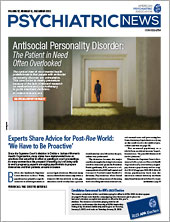Asking patients about their video game or video game–related social media habits is not a routine part of a clinical discussion, but it might be a worthwhile topic, especially for LGBTQ+ individuals, said Chadden Noureddine, M.D., a psychiatry resident at Icahn School of Medicine at Mount Sinai in New York.
Her comments came during a session on the portrayal of LGBTQ+ characters in video games at this year’s Mental Health Services Conference. Noureddine hosted the session with fellow Mount Sinai psychiatry resident Jamie Parkerson, M.D. The session was moderated by APA President-elect Petros Levounis, M.D., a professor and chair of psychiatry at Rutgers University Medical School.
Though video gaming has been growing in popularity for decades, the pandemic kicked video game play into overdrive, Parkerson said. She noted that video game sales increased by over 60% between March 16 and March 22, 2020 (a period when U.S. states were just beginning to issue stay-at-home orders), as video gaming became a coping strategy for children and adults alike.
The gaming community includes members of many sexual and gender minorities. A 2021 survey from Nielsen found that 10% of U.S. adults who play video games identify as LGBTQ+ compared with 5% to 6% of the general population. This demographic also spends more on video games monthly.
In part, this might be due to the ability of today’s online games to function as social hubs in addition to entertainment breaks. “If you look internationally, there are still many countries where homosexuality is punishable by law, and games are one way LGBTQ+ people can safely find people like themselves and have conversations,” Levounis said during the discussion portion of the session. “I think that is a tremendous positive of internet gaming.”
However, unlike straight gamers, LGBTQ+ gamers historically have experienced very little representation of their community in the games they play. Just as in movies or television, gay, lesbian, or transgender characters or stories were almost nonexistent in gaming until the past decade or so, noted Parkerson. When LBGTQ+ characters were present, she noted, they tended to be the villain or cloaked in caricature.
Significant strides in the number and accuracy of portrayals of LGBTQ+ characters in video games have been made in recent years, though there is still a way to go. She noted that there are ongoing concerns that the inclusion of LGBTQ+ characters in video games is predominantly to attract users, with less regard for creating a different game experience from a LGBTQ+ perspective.
Video games are likely having both positive and negative mental health impacts on today’s LGBTQ+ gamers, Noureddine said, so it is important to know how and why they game. She suggested that mental health professionals ask patients who identify as LGBTQ+ about the genre of the games they most enjoy, whether they choose to play queer or straight characters in games, or whether they even care about LGBTQ+ representation in games. In addition to building a therapeutic bond, such questions can help professionals see how gamers see themselves.
It is also important to assess how frequent patients are gaming and engaged in other gaming-related activities, such as streaming other gamers on channels like Twitch or spending time in online gaming forums.
Video games have the potential to become addictive, as evidenced by the inclusion of internet gaming disorder in DSM-5 (under Conditions for Further Study). Some surveys suggest that adults who identify as sexual and gender minorities may be more vulnerable to gaming addiction than others.
Levounis cautioned that gaming disorder is not just about frequency; an individual needs to experience significant distress in several aspects of their life due to excess gaming.
“Maybe 5% of gamers or less will develop a medical problem,” he said. “For the rest, whether they are playing too much is a psychological and sociological debate.” ■

